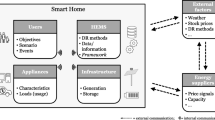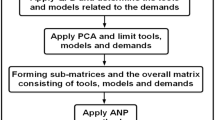Abstract
This work aims to provide an accurate assessment of a demand response program that encourages cyber-physical interactions in residential power distribution systems. The advanced technologies considered in this chapter include Wi-Fi-enabled programmable smart thermostats, high-efficiency and connected water heaters, residential battery storage systems, improved weatherproofing, and advanced metering infrastructure (AMI). We present the design of a field demonstration study, the data collection method, and the data-driven comparative evaluation methodology. In analyzing the impacts of various technologies on a home’s coincident load, we propose a novel day-matching algorithm combined with a paired t-test. In analyzing annual energy savings and efficiency, we propose a two-stage algorithm considering three seasons (shoulder, winter, and summer) and degree-day adjustment factors. The new evaluation methods are implemented on a demand response pilot program with 330 participating homes in a mid-western US municipality, each installed with various technologies. Computational results on the impacts of each technology on the coincident load and annual energy savings show the proposed data-driven methods are effective and scalable.
Access this chapter
Tax calculation will be finalised at checkout
Purchases are for personal use only
Similar content being viewed by others
References
P. Cappers, C. Goldman, D. Kathan, Demand response in us electricity markets: empirical evidence. Energy 35(4), 1526–1535 (2010)
Y. Chen, L. Zhang, P. Xu, A. Di Gangi, Electricity demand response schemes in china: pilot study and future outlook. Energy 224, 120042 (2021)
Federal Energy Regulator Commission, 12 December 2022, Electric Quarterly Reports (EQR), 2021. https://www.ferc.gov/power-sales-and-markets/electric-quarterly-reports-eqr
G. Conte, D. Scaradozzi, A. Perdon, M. Cesaretti, G. Morganti, A simulation environment for the analysis of home automation systems, in 2007 Mediterranean Conference on Control & Automation (2007), pp. 1–8
N.R. Council et al., Completing the Forecast: Characterizing and Communicating Uncertainty for Better Decisions Using Weather and Climate Forecasts (National Academies Press, 2006)
E. Dunham-Jones, Seventy-Five Percent (2000)
F. Di Maio, S. Morelli, E. Zio A simulation-based framework for the adequacy assessment of integrated energy systems exposed to climate change. Springer International Publishing, pp. 1–35 (2021). https://doi.org/10.1007/978-3-030-72322-4_125-1
J.K. Gruber, M. Prodanovic, Residential energy load profile generation using a probabilistic approach, in 2012 Sixth Uksim/Amss European Symposium on Computer Modeling and Simulation (2012), pp. 317–322
E.T. Hale, L.A. Bird, R. Padmanabhan, C.M. Volpi, Potential Roles for Demand Response in High-Growth Electric Systems with Increasing Shares of Renewable Generation. Technical Report, National Renewable Energy Lab. (NREL), Golden, 2018
K. Li, B. Wang, Z. Wang, F. Wang, Z. Mi, Z. Zhen, A baseline load estimation approach for residential customer based on load pattern clustering. Energy Proc. 142, 2042–2049 (2017)
G.S. McMaster, W. Wilhelm, Growing degree-days: one equation, two interpretations. Agric. For. Meteorol. 87(4), 291–300 (1997)
T.H. Pedersen, R.E. Hedegaard, M.D. Knudsen, S. Petersen, Comparison of centralized and decentralized model predictive control in a building retrofit scenario. Energy Proc. 122, 979–984 (2017)
B. Shen, G. Ghatikar, C.C. Ni, J. Dudley, P. Martin, G. Wikler, Addressing Energy Demand Through Demand Response. International Experiences and Practices. Technical Report, Ernest Orlando Lawrence Berkeley National Laboratory, Berkeley, 2012
V. Stavrakas, A. Flamos, A modular high-resolution demand-side management model to quantify benefits of demand-flexibility in the residential sector. Energy Convers. Manag. 205, 112339 (2020)
B. Stoll, E. Buechler, E. Hale, The value of demand response in Florida. Electr. J. 30(9), 57–64 (2017)
M. Sun, Y. Wang, G. Strbac, C. Kang, Probabilistic peak load estimation in smart cities using smart meter data. IEEE Trans. Ind. Electron. 66(2), 1608–1618 (2019)
H.C.S. Thom, The rational relationship between heating degree days and temperature. Mon. Weather Rev. 82(1), 1–6 (1954)
J. Torriti, M.G. Hassan, M. Leach, Demand response experience in Europe: policies, programmes and implementation. Energy 35(4), 1575–1583 (2010)
K.M. Tsui, S.-C. Chan, Demand response optimization for smart home scheduling under real-time pricing. IEEE Trans. Smart Grid 3(4), 1812–1821 (2012)
M. Ullah, A. Wolff, P. Nardelli Processing Smart Meter Data Using IoT, Edge Computing, and Big Data Analytics. Springer International Publishing pp. 1–15 (2021). https://doi.org/10.1007/978-3-030-72322-4_124-1
A. Zheng, A. Casari, Feature Engineering for Machine Learning: Principles and Techniques for Data Scientists (O’Reilly Media, Inc., 2018)
Author information
Authors and Affiliations
Corresponding authors
Editor information
Editors and Affiliations
Rights and permissions
Copyright information
© 2023 Springer Nature Switzerland AG
About this entry
Cite this entry
Bai, L., Roy, A. (2023). Novel Data-Driven Methods for Evaluating Demand Response Programs in a Smart Grid. In: Fathi, M., Zio, E., Pardalos, P.M. (eds) Handbook of Smart Energy Systems. Springer, Cham. https://doi.org/10.1007/978-3-030-97940-9_152
Download citation
DOI: https://doi.org/10.1007/978-3-030-97940-9_152
Published:
Publisher Name: Springer, Cham
Print ISBN: 978-3-030-97939-3
Online ISBN: 978-3-030-97940-9
eBook Packages: Business and ManagementReference Module Humanities and Social SciencesReference Module Business, Economics and Social Sciences




